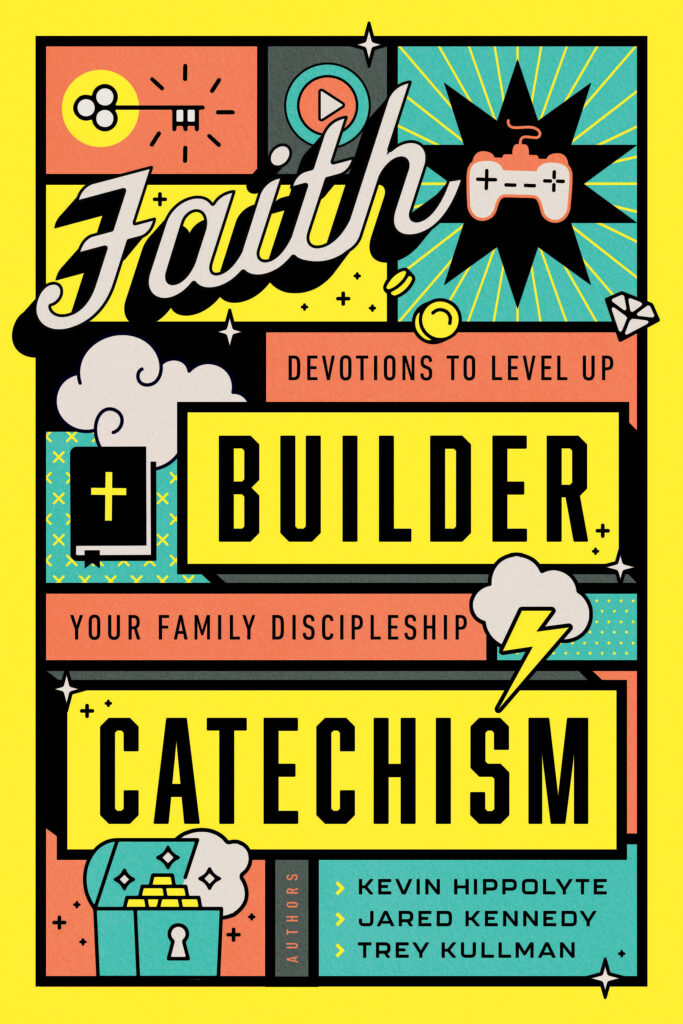In this digital age, it can be difficult to keep kids’ attention, especially during family devotional time. However, kids have always loved asking questions, and they do like a challenge. Faith Builder Catechism: Devotions to Level Up Your Family Discipleship keeps kids attention with fifty-two questions and answers in a fun and interactive format to help them “level up” on biblical truth. This weekly devotional will help families press pause on screen time and develop healthy discipleship rhythms.
Faith Builder Catechism was written by three dads, Kevin Hippolyte, Jared Kennedy, and Trey Kullman, all raising kids in a digital world, experienced in children’s and family ministry. They understand what captures kids’ attention. In this interview, we talk to the authors about the inspiration behind the book, the importance of family devotional time, and helping your children develop a Christian worldview.
Q: You are part of a team that has written a devotional that connects building faith to the world of video games. How do these two things connect?
Most of the video games we love involve some sort of exploration. Your character dives into a dark cave, sneaks through a castle, or darts across platforms to discover something new or find whatever treasure you’re chasing after. As you progress through the adventure, you learn how the world works, build skills and strategies to navigate obstacles, and start to master some areas of the game.
Similarly, building faith in our kids requires exploration. We want to spend time journeying through the Bible to show them truths about who God is, who we are, and how he designed us to live. We learn about the church and kingdom he’s building, and what he calls us to do. The growth comes through walking alongside our kids through these foundations of the faith. As we do, we help them to see God’s goodness and to discover a longing to pursue the treasure of faith in Christ themselves.
Q: For some, the word “catechism” can be intimidating, giving the impression of lots of memorization or a sense of formality. Can you explain what catechism actually is?
While the word catechism might sound fancy or weird, it’s actually a pretty simple idea. You can think of a catechism as a set of short, easy-to-remember questions about the basics of the Christian faith. Churches have used them for centuries to help folks interested in Christianity wrap their heads around what it means to follow Jesus.
We wanted to build a catechism that was not only effective in teaching kids the foundational truths of Christianity, but one that they’d enjoy interacting with. The questions and answers are written in language you and your kids can understand, the devotions are connected to video games that will draw your kids into the truth they’re studying, and it’s paired with a visual flair that’s engaging and interactive. Let’s set aside the idea of a formal, intimidating catechism and warp ahead to the next level of excitement and engagement as we learn together!
Q: Faith Builder Catechism is designed as a 52-week devotional. How much does it take a family to complete the devotional each week?
One of the things we wanted to avoid with this devotional was the pressure for parents to carve out a ton of time over multiple days each week. We wanted to create a resource that serves as an easy win for parents, especially those who’ve never had any sort of discipleship rhythms with their kids before. You don’t need a Bible degree, an acoustic guitar, or a stocked craft closet to jump in with Faith Builder Catechism. Just the book, a Bible, and around ten minutes. The devotional includes ice-breaker style “Power-up” questions and “Think about It” questions” to help your family reflect on each devotional or passage.
Q: Why is it important for families to set aside a specific time for devotionals and developing healthy discipleship rhythms?
If you fail to plan, you plan to fail. It’s hard to experience growth in any area of life without setting aside consistent time to work on it. My body isn’t going to get stronger just because I buy weights. I have to set aside the time to pick them up and work out consistently. Our discipleship is the same way. We must carve out the time to dive into God’s Word regularly, or we’ll be hard-pressed to grow in our knowledge, understanding, and dependence on the Lord.
Of course, families are busier now than they’ve ever been. That’s why we’ve designed Faith Builder Catechism to draw you back to the foundational truths of the faith together week after week. For some families, it’ll initially be difficult to find the one small block of time each week. But as you start building the habit, you’ll find it easier and easier to make a family discipleship time happen with less complaining, distraction, and temptation to punt it for something else.
If we want to grow in our love and adoration for God, we must be intentional about drawing near to him. Building this weekly rhythm is a great first step in that process.
Q: What age range is the book written for? How can families whose children range in ages adapt the content to make the devotionals work for everyone?
Faith Builder Catechism is geared toward kids in middle elementary (2nd/3rd grade) through middle school. It’s designed for parents to work through the book with their children, but older kids should be able to engage with it independently as well.
If your family has multiple kids who are close in age, they’d do great working through it together. You could also go through the book separately with multiple kids if you think they’d benefit from more individualized attention and opportunities to share their thoughts and questions, as they go. You know your family best so you should feel the freedom to adapt any of the questions to dive deeper with older, more mature kids, or simplify things for younger kids who have less experience exploring spiritual things.
Q: How does Faith Builder Catechism carry the video game theme throughout?
The “power-up” questions and devotional sections typically always involved something video game-related. Two of the three of us classify ourselves as “old,” so we’ve got lots of gaming memories to share from the old, pixelated days of the Atari up through the current generation of consoles and games.
Q: Do you only use video game references, or do you also use other cultural references that are relevant to kids?
While the bulk of our illustrations are pulled from video games, we use all sorts of other things to connect kids to the truths we’re learning about. We touch on movies, TV shows, Legos, toys, science, etc. to help kids make meaningful connections to the catechism devotionals.
Q: What are the elements that make up each devotional? Can you walk us through a single devotional?
Each lesson kicks things off with the actual catechism question and answer. Next, we’ve got a memory verse that you can work on throughout the week. The power-up question comes next and gives both parents and kids a chance to talk together answering a fun icebreaker-style question. Then we’ve got a Bible passage to read together that leads us to the actual devotional piece of the lesson. Families will read through that together, then dive into a Think about It question, and finally pray together to close.
Q: How can a family continue to have conversations throughout the week about the devotional?
While we wanted the bar of entry to be low for the weekly devotional, we also wanted to make room for the conversation to continue through the week. After all, it’s not helpful to read deep truths about the faith and then forget them. We want to hide what we’re learning about God in our hearts.
The easiest way to do that is to find ways to rehearse the catechism question and answer and memory verse together each week. Maybe it’s post its on the bathroom mirror to read over as they brush their teeth, or next to their console so they can repeat it each time they fire up or power down their game. You can also make use of time you’re already spending together to reflect on the week’s lesson—over dinner, during carpool before/after school, walking the dog, etc. Be as creative as you want to be, but most families find the most success working these conversations into time they’re already spending together instead of trying to schedule a time to review/reflect.
Q: As parents, we know what it means to have a Christian worldview, but how can we help our kids understand what that looks like in their daily lives?
In a culture that’s hostile to the things of God, kids need a Christian worldview that helps them to see reality clearly—as God sees it. Our book helps kids build a biblical vision of the world brick by brick as families work through God’s glory, God’s kingdom, the gospel, God’s grace, and God’s church and mission. The truths kids will learn in each of these sections help introduce them to a faith that they can hold fast throughout their lives. These truths will help them to stay strong as they face life’s joys, fears, longings, excitement, and frustrations. The questions, answers, and devotionals will help kids to hide God’s truth in their hearts. Simply knowing these truths won’t save them, but the devotionals will point them to a Savior who can.
Q: Tell us about Gospel-Centered Family and the resources available to families through the website.
Gospel-Centered Family provides resources for parents as well as children’s and student ministry leaders through three avenues. First, our website offers books (like Faith Builder Catechism), how-to articles, book reviews, and more. Next, our weekly newsletter from Trey includes a personal devotional along with a round-up of helpful links from around the web that touch on parenting, discipleship, ministry leadership, and ridiculous parenting memes/reels. Finally, we offer a children’s ministry coaching cohort that meets twice a year to help leaders think through ministry vision, building/choosing curriculum, team building, leadership development, classroom management, and much more. You can find links to all of these resources at www.gospelcenteredfamily.com.
faith builder catechism
Faith Builder Catechism is a 52-week devotional that helps families press pause on screen time and develop healthy discipleship rhythms in a fun, interactive format. Authors Kevin Hippolyte, Jared Kennedy, and Trey Kullman lead the way for families to establish regular discipleship conversations and cultivate a deeper knowledge of the theology expressed in the Apostle’s Creed, the Ten Commandments, the doctrines of grace, the Great Commission, and the Lord’s Prayer.






